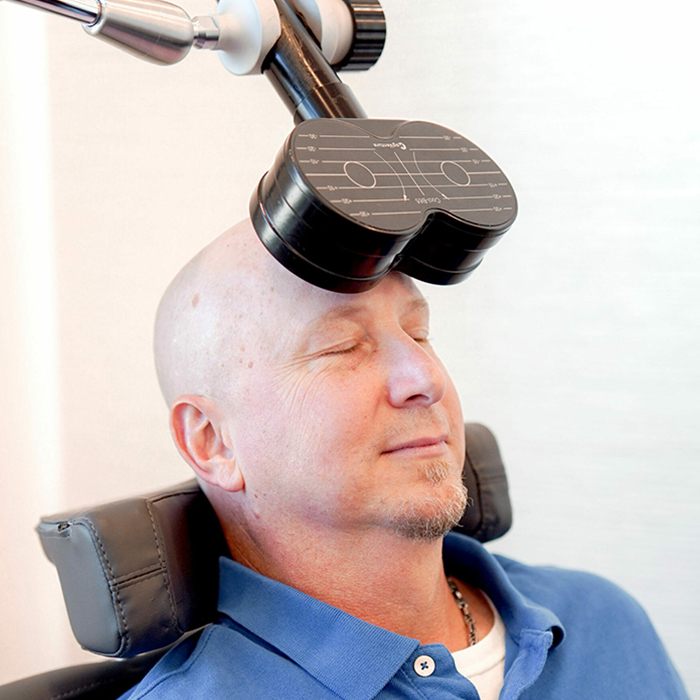MeRT: The Breakthrough Anxiety Treatment That Could Change Your Life

MeRT is an Entirely New Approach to Anxiety Treatment
Occasional anxiety is a part of life, particularly in our 21st-century society. But when that anxiety doesn’t go away, it’s something more: an anxiety disorder.
Anxiety disorders will affect one-third of US adults at some time in their lives. If you’re experiencing extreme anxiety like this, you know it’s not about the statistics — it’s about fatigue, restlessness, panic attacks, trouble concentrating, and so much more. And you’d do anything to make it stop.
You may have tried antianxiety medications, but they only offer relief for a short time, then the anxiety returns. Plus, these medications can have serious side effects.
We know how frustrating this can be. We also know that another solution exists, one that’s free from drugs or invasive surgeries. It’s called MeRT, and we are one of the few clinics able to deliver this breakthrough treatment.
MeRT, which stands for Magnetic EEG-Guided Resonance Therapy, is an advanced form of TMS (transcranial magnetic stimulation). We use gentle magnetic pulses, guided by sophisticated qEEG imaging, to balance your brain function.
MeRT is effective, gentle, and lasting. And it can work when other treatments have failed or when medications have had unwanted side effects. In essence, MeRT is a chance to be finally free from your anxiety symptoms — for good.
How MeRT Works for Anxiety Treatment
The MeRT treatment process utilizes TMS to improve brain function. TMS modulates the brain’s activity by using magnetic fields that pass through the scalp from an electromagnetic coil. However, MeRT is a much more individualized approach than standard TMS.
TMS has been used for a long time to treat dysregulation in the brain. However, standard TMS is more of a one-size-fits-all approach to treatment since it can only target a single location in the brain with a single frequency, regardless of condition.
MeRT is a unique and much-improved process of using TMS:
First, we perform a quantitative EEG, also known as brain mapping, to determine exactly what part of the brain is affected and to what degree. The results will show the brain’s exact brainwave pattern and function.
Then, using this detailed analysis, our doctors can determine the exact neural synchronization protocol, which will differ for each patient. We customize the frequency, location, and power of the magnet to achieve the best possible results.
By tailoring TMS to each person’s unique brainwave activity, we can encourage improved communication within the brain. This can lead to significant clinical improvements.
MeRT treatment for anxiety is usually four to eight weeks long. Since it is a type of therapy, appointments are every day, Monday through Friday, and usually last about 30 minutes.
Most often, you will begin to notice improvements in the way you feel during the first week. After going through treatment, there is not usually a need for any follow-up treatment.
How Does Anxiety Affect Your Brain?

Anxiety can affect the brain in several ways, influencing both its structure and function.
The amygdala, a region of the brain involved in emotional processing, becomes particularly active during anxiety. This hyperactivity can lead to heightened fear responses.
Anxiety can impact the hippocampus, which is crucial for memory formation. Chronic stress and anxiety can impair memory and learning.
Anxiety disorders can be associated with imbalances in neurotransmitters like serotonin, dopamine, and norepinephrine. These chemicals are important for mood regulation and cognitive function.
The prefrontal cortex, involved in decision-making and social behavior, can be affected by anxiety. This may result in difficulties with concentration, decision-making, and managing emotions.
Chronic anxiety can lead to elevated levels of cortisol, the body’s main stress hormone. High cortisol levels can lead to impaired cognitive abilities and a weakened immune response.
Anxiety can alter the connectivity between different regions of the brain. This can affect how the brain processes information, potentially leading to heightened anxiety or panic attacks.
Anxiety can hyperactivate the autonomic nervous system, leading to physical symptoms like increased heart rate, sweating, and rapid breathing. This response is part of the body’s fight-or-flight reaction.
Anxiety Disorders and Their Symptoms

As we have mentioned, having occasional worry or stress doesn’t mean you have an anxiety disorder. Anxiety disorders occur more frequently, affect your overall well-being, and often get worse over time.
According to the Anxiety and Depression Association of America, anxiety disorders affect 40 million US adults every year.
Types of anxiety disorders include:
- Generalized Anxiety Disorder (GAD): This is when you have uncontrollable worry about things that normally wouldn’t be an issue.
- Panic Disorder: This happens when you have unexpected and reoccurring panic attacks.
- Social Anxiety Disorder: This is an intense fear of being judged, embarrassed, or humiliated in social situations.
- Specific Phobias: These include fear of heights (acrophobia), flying (aerophobia), open spaces (agoraphobia), and many more.
- Feeling constantly on edge and unable to relax
- Experiencing a noticeable acceleration in heartbeat
- Breathing quickly and shallowly (hyperventilation)
- Shaking, sweating, and a general feeling of weakness
- Overwhelming tiredness
- A persistent feeling that something bad is about to happen
- Challenges in focusing or staying attentive
- Struggling with sleeping patterns or disturbances
- Experiencing digestive problems often linked to stress
- Staying away from situations or people that may provoke anxiety
If you think you might be interested in exploring MeRT for anxiety treatment, you don’t have to decide anything right away

We understand that considering a treatment that you don’t know that much about can be daunting. You may feel quite uncertain about whether this is right for you.
Your first easy step is to start with a simple phone consultation with our New Patient Coordinator. Here, you can discuss your symptoms and history, ask all the questions you want, and have her explain the protocols, fees, and details of treatment.
If, after this, you are interested in taking the next step in seeing if MeRT treatment is right for you or your loved one, we will initially schedule two appointments. Both appointments are about 45 minutes long.
At the first appointment, our neuro-technician will perform an EEG and an EKG. Both are simple, painless, and non-invasive tests to see exactly what is happening in your brain.
At the second appointment, a few days later, when your test results are in and analyzed, you will have a one-on-one consultation with the doctor. Here, you will discuss your test results, ask any additional questions that you may have, and together determine if you (or your child, if this is about your child) are a candidate for treatment.
If you are uncertain whether MeRT is the right treatment for you, the testing and consultation will allow both you and the doctor to decide if you may benefit.
Assessment Period
If you and the doctor decide to move forward with MeRT, the next step is what we call the Assessment Period. Here, we will perform an initial period of treatment, followed by a new EEG to see if you are responding. The assessment period includes daily treatment Monday through Friday for the first week and Monday through Thursday for the second week.
During this assessment, we are looking for any clinical changes and that you are having a positive response to the treatment. You (or your child) will likely notice improvements starting to take place. Once we confirm this, you will continue treatment protocols.